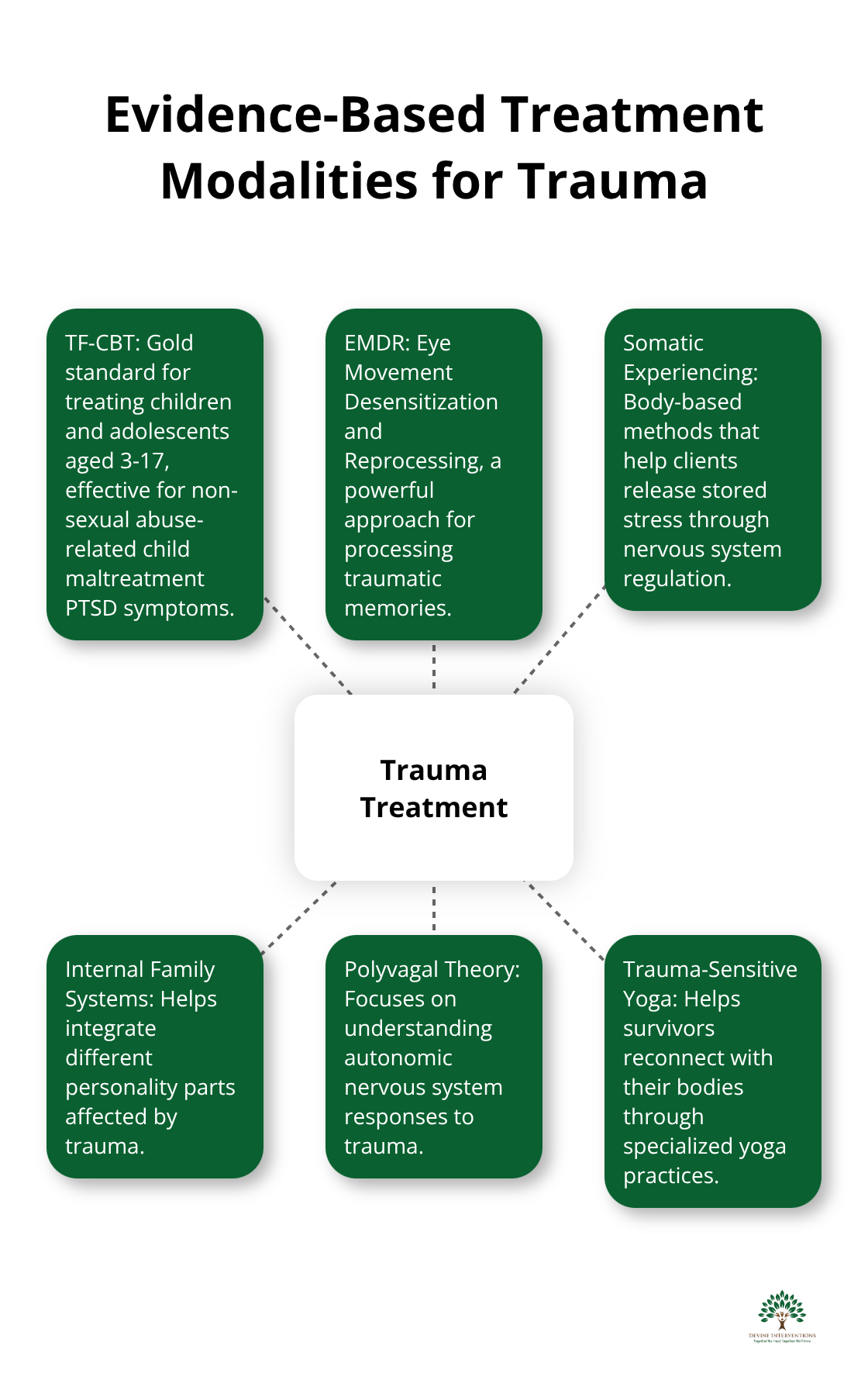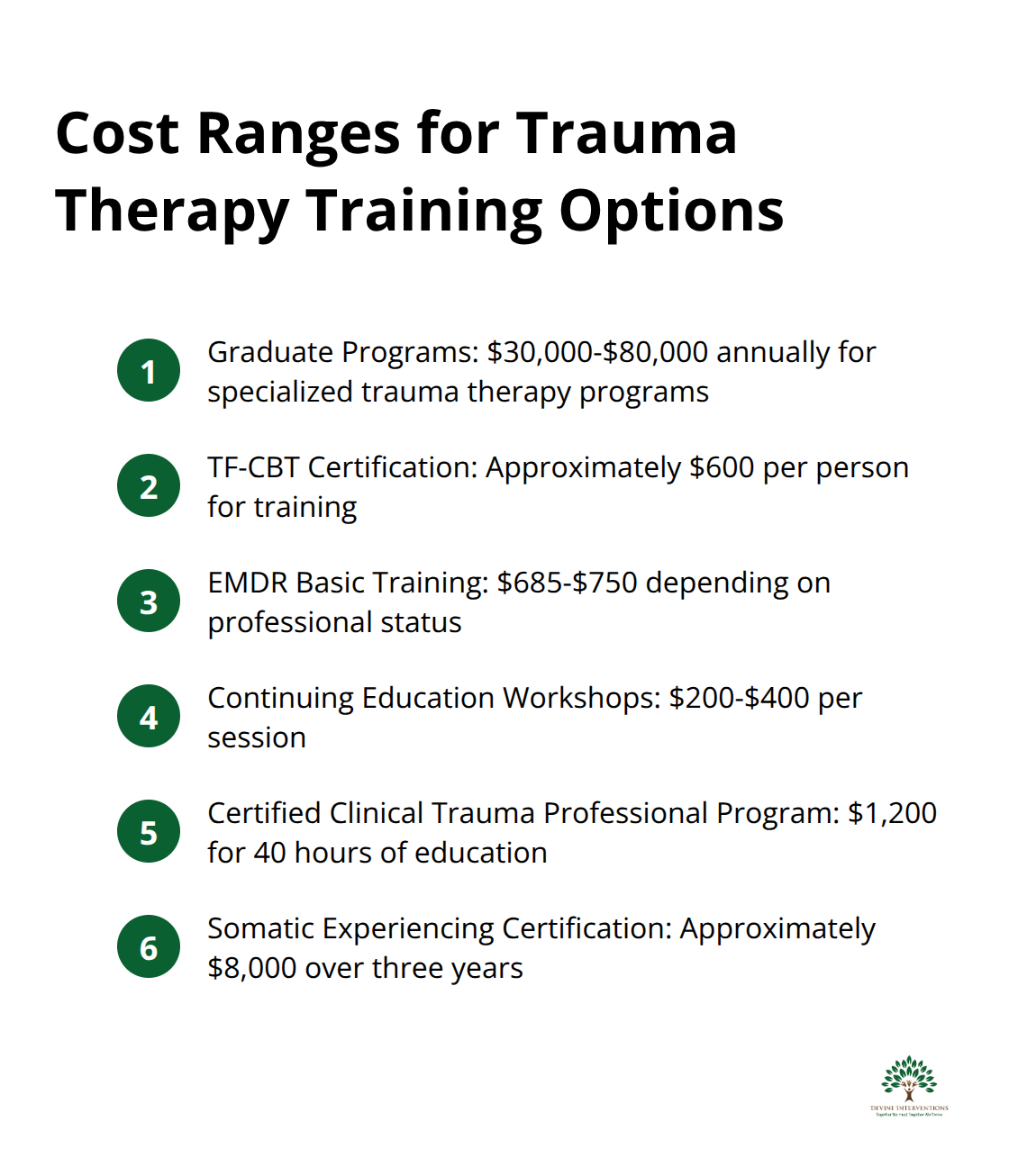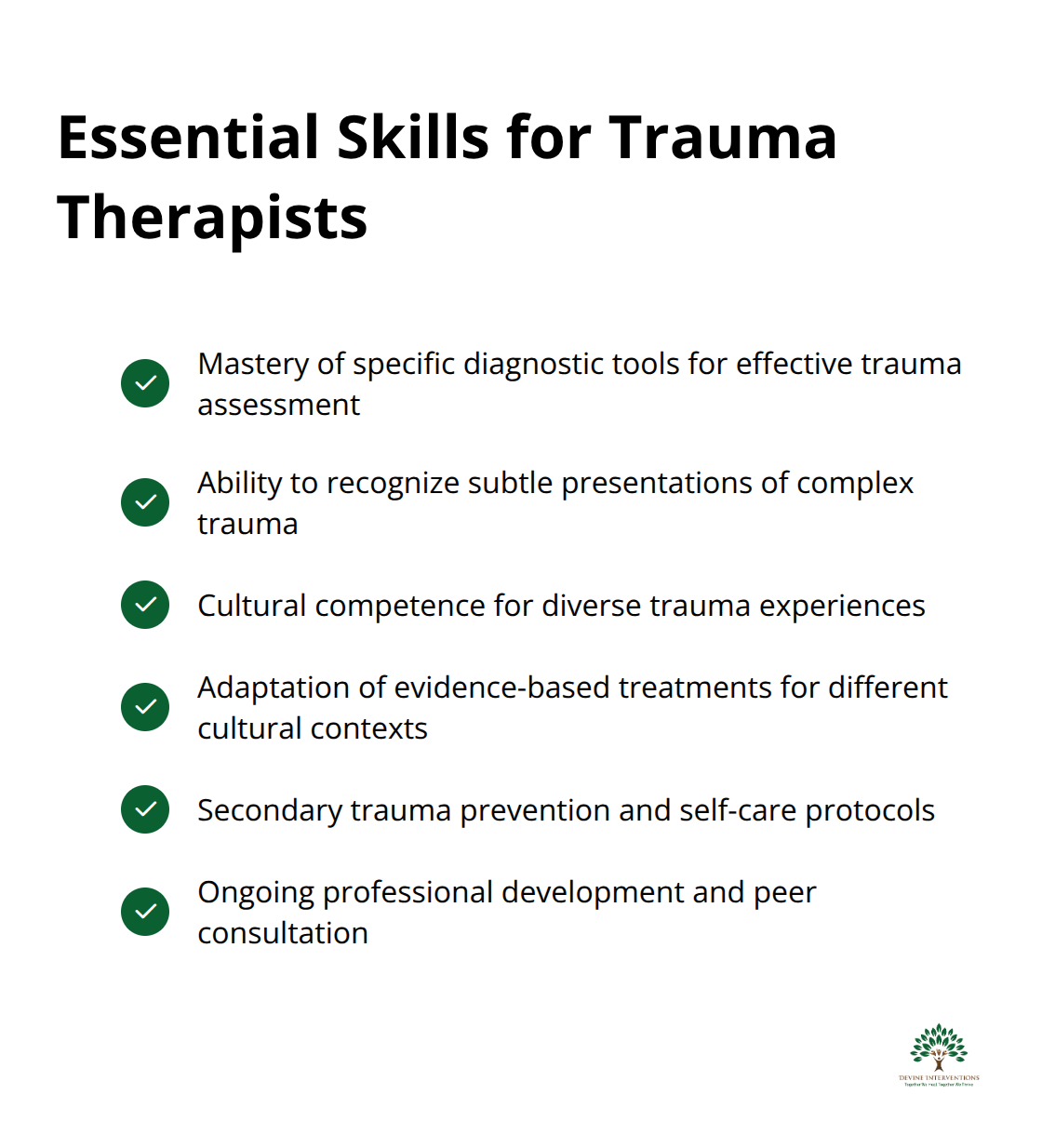Trauma-focused therapy training opens doors to helping survivors heal from their deepest wounds. The demand for qualified trauma therapists continues growing as mental health awareness expands nationwide.
We at Devine Interventions understand the importance of proper training in evidence-based trauma treatments. This guide walks you through certification pathways, essential skills, and practical steps to build your expertise in trauma therapy.
Evidence-Based Treatment Modalities for Trauma
TF-CBT Training and Certification Standards
Trauma-Focused Cognitive Behavioral Therapy stands as the gold standard for treating children and adolescents aged 3-17. TF-CBT is effective for non-sexual abuse-related child maltreatment PTSD symptoms and is also likely effective for a range of other key trauma symptoms while it strengthens family relationships. The certification process requires participants to complete a web-based course followed by 12 months of consultation to achieve national certification.
Training costs typically run $600 per person, with participants needing a master’s degree in mental health. The Missouri Academy for Child Trauma Studies (MoACTS) provides four-day training in Trauma-Focused Cognitive Behavioral Therapy led by TF-CBT National Trainers for child-focused clinicians across the United States. Participants must complete a TF-CBT case during the consultation period to meet certification criteria.
EMDR Certification Requirements
Eye Movement Desensitization and Reprocessing represents another powerhouse approach, with basic training costs that range from $685-$750 (depending on professional status). EMDR requires 10 hours of case consultation with an approved facilitator, plus completion of required texts including “Getting Past Your Past.”
EMDR training spans two weekend sessions with mandatory consultation within one year of completion. Participants must score 80% or higher on post-training assessments to receive certification. The EMDR Institute requires licensed professionals or pre-licensed clinicians who work under supervision. Group consultation rates range $30-$50 per hour, which makes ongoing support affordable for most practitioners.
Advanced Trauma Treatment Approaches
Somatic Experiencing and Internal Family Systems therapy address trauma’s physical and emotional components through specialized techniques. Somatic Experiencing International offers body-based methods that help clients release stored stress through nervous system regulation. IFS therapy helps integrate different personality parts that trauma affects, with comprehensive training available through the IFS Institute.
Polyvagal Theory training teaches practitioners about autonomic nervous system responses to trauma, while Trauma-Sensitive Yoga helps survivors reconnect with their bodies. These approaches require specialized certification but offer unique pathways for complex trauma cases that traditional talk therapy cannot reach effectively. Each method provides distinct advantages for different client populations and trauma presentations.
The variety of evidence-based approaches creates multiple pathways for aspiring trauma therapists to build their expertise and find their preferred treatment modality.

How Do You Choose the Right Training Path
Graduate Programs with Trauma Specializations
Graduate programs that specialize in trauma therapy provide the strongest foundation for aspiring practitioners. Clinical Psychology doctoral programs at institutions like George Washington University and Pepperdine University offer trauma specializations with supervised practicum experiences. Master’s programs in Clinical Mental Health Counseling or Marriage and Family Therapy include trauma coursework, but dedicated trauma tracks at schools like Lesley University provide deeper specialization.
These programs typically require 60 credit hours and cost $30,000-$80,000 annually (making them significant investments that pay dividends through comprehensive preparation). Students gain hands-on experience through supervised clinical rotations and research opportunities that build both practical skills and theoretical knowledge.
Professional Development and Continuing Education Options
Continuing education workshops offer practicing clinicians faster pathways to trauma expertise. The National Child Traumatic Stress Network provides free webinars and resources, while organizations like PESI offer intensive weekend workshops that range $200-$400 per session. The Certified Clinical Trauma Professional program through the International Association for Trauma Professionals costs $1,200 and includes 40 hours of trauma-specific education.
These shorter programs work best for licensed professionals who seek to expand their skill sets without returning to graduate school. Many states accept these programs for continuing education credit requirements, which helps maintain professional licenses while building specialized expertise.

Online Training Versus In-Person Learning
Online trauma education has exploded since 2020, with platforms like Trauma Training that offer comprehensive certification programs at 30-40% lower costs than in-person alternatives. However, hands-on skills like EMDR require in-person practice sessions for proper technique development. Complex trauma interventions demand face-to-face supervised practice that online formats cannot replicate effectively.
Hybrid programs that combine online theory with in-person skill practice represent the optimal approach. The EMDR Institute now offers virtual basic education weekends followed by required in-person consultation, which reduces travel costs while maintaining quality standards.
Specialty Certifications and Advanced Training
Advanced practitioners often pursue multiple certifications to serve diverse client populations effectively. Somatic Experiencing certification takes three years and costs approximately $8,000, while Internal Family Systems training requires Level 1 through Level 3 completion over 18 months. These specialized approaches command higher fees and attract clients who need complex trauma treatment.
Professional organizations like the International Society for Traumatic Stress Studies offer annual conferences where practitioners network and learn cutting-edge techniques. These events cost $400-$600 but provide access to research findings and expert presentations that shape the field’s future direction.
What Skills Do Trauma Therapists Need Most
Trauma Assessment and Diagnostic Precision
Effective trauma assessment demands mastery of specific diagnostic tools that extend far beyond standard intake procedures. The Clinician-Administered PTSD Scale for DSM-5 takes 45-60 minutes but provides the gold standard for PTSD diagnosis. The Childhood Trauma Questionnaire identifies five trauma types through 28 questions, while the Adverse Childhood Experiences questionnaire predicts adult health outcomes with remarkable accuracy.
Practitioners must learn to spot dissociation symptoms that many trauma survivors experience but rarely report directly. Complex trauma presents differently than single-incident PTSD and requires assessment of emotional regulation, interpersonal difficulties, and self-concept disruptions that standard PTSD measures miss entirely. Skilled therapists recognize these subtle presentations and adapt their assessment approach accordingly.
Cultural Competence for Diverse Trauma Experiences
Cultural factors shape how clients experience, express, and heal from trauma in ways that generic programs often ignore. Latino clients may present trauma through somatic complaints rather than psychological symptoms, while African American clients face historical trauma that compounds individual experiences. Native American communities experience intergenerational trauma along with multi-generational trauma, mental illness, suicide, and substance abuse disorders.
Military families need specialized understanding of deployment cycles and combat exposure, while LGBTQ+ clients require knowledge of minority stress and discrimination trauma. Practitioners must adapt evidence-based treatments like TF-CBT for different cultural contexts while they maintain treatment fidelity. This adaptation requires deep cultural knowledge and sensitivity to avoid perpetuating harm.
Secondary Trauma Prevention and Professional Sustainability
Trauma therapists face significant burnout rates within their first five years without proper self-care protocols. The Professional Self-Care Inventory helps practitioners monitor their emotional, physical, and spiritual wellness through specific behaviors. Supervision requirements vary by state but should include trauma-specific consultation monthly at minimum.
Peer consultation groups reduce isolation while they provide case discussion opportunities that prevent secondary trauma accumulation. Regular trauma exposure creates physiological changes in therapists’ stress response systems, which makes personal therapy essential rather than optional for sustained practice. Therapists who prioritize their own wellness deliver better outcomes for their clients.

Final Thoughts
A successful career in trauma-focused therapy training demands dedication, continuous education, and strong support systems. The field presents tremendous growth opportunities as mental health awareness expands across communities nationwide. Practitioners who invest in comprehensive programs and maintain certifications position themselves for sustained success in this rewarding specialty.
Professional development continues throughout every trauma therapist’s career. The International Society for Traumatic Stress Studies hosts annual conferences where practitioners access cutting-edge research and connect with field experts. Organizations like PESI offer monthly workshops that keep skills current, while peer consultation groups provide case discussion opportunities that prevent burnout and secondary trauma (essential for long-term practice sustainability).
Your trauma-focused therapy training journey starts with the right educational pathway for your career goals. Whether you pursue graduate specializations, professional certifications, or continuing education workshops, each step builds expertise that transforms lives. We at Devine Interventions combine clinical excellence with compassionate care through our evidence-based approach for children, adolescents, and adults who need comprehensive trauma treatment.







